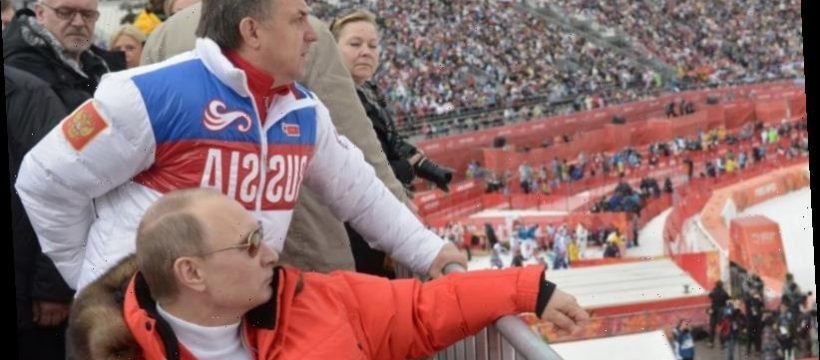Pushing aside that burning, unanswerable question as to whether Latrell Mitchell eventually ends up deciding on accepting that spot on the practice squad for the Washington Redskins, thus eschewing his rightful place in the main draw of the 2020 World Darts Championships (the battle from behind the oche commences on Friday …), there are actually other matters afoot in world sport, of equal importance.
On Monday, a meeting of the 12-person Executive Committee of the World Anti-Doping Agency – WADA’s ultimate policy-making authority – will be charged with the responsibility of deciding the immediate future of Russia’s participation in world sport.
Russian president Vladimir Putin and sport minister Vitaly Mutko watch the 2014 winter Olympics in Sochi.Credit:RIA NOVOSTI KREMLIN
That “world sport”is even at this intersection, is startling. In the tiniest of nutshells, this matter is before the ExCo because it has been determined by WADA’s Compliance Review Committee – after a painfully protracted investigation and the forensic analysis of more than 24,000 gigabytes of Russian doping files and associated data – that Russian sport and anti-doping officials had purposely attempted to hide hundreds of failed drug test results; manipulated other evidence; and destroyed some records all together.
Consequently, the CRC’s recommendations to the ExCo – which the ExCo must decide to endorse or otherwise next week – include that, for a period of four years from on Monday (subject to any appeal to the Court of Arbitration for Sport): Russian government officials and representatives are forbidden from attending events such as the Olympic Games and sport-specific world championships; Russian teams cannot participate, as a national delegation, in any such events including the Olympics; Russia cannot host any such events; and, Russia must not bid for the right to host the 2032 Olympic Games.
The main caveat is that a window is open for Russian athletes and their support personnel to participate in the Olympic Games and other major events during that four-year period, provided that the athlete can prove on balance that he or she isn’t implicated in what the CRC has labelled “an extremely serious case of non-compliance”.
Factors to be taken into account in determining whether an athlete can prove their “innocence”, include whether they’re adversely mentioned in those 24 terabytes of Russian doping data (or the Golden Book version of what’s left of it), and whether data pertaining to them specifically has been manipulated or corrupted.
Maria Sharapova tested positive to Meldonium.Credit:Clive Brunskill
It’s a desperately unacceptable reality of the Olympic Games, for example, that cheated athletes must sometimes wait years to receive medals which should rightfully have been awarded to them at a Games, but for doping. Indeed, some athletes never attain that level of rectification.
Yet it’d be a monstrously harsh and individually unfair position to take: to exclude a nation’s entire delegation from an Olympic Games. Causing Russia’s clean athletes to become collateral damage could on the other hand be the necessary consequence of the state-orchestrated cheating, if they can’t prove their innocence. If doping programs involving Russian athletes have operated, as claimed by WADA, then some who can’t prove they weren’t a pawn in the game might be the only reasonable outcome.
Where to draw the line? Even a skerrick less than WADA’s ExCo full endorsing and embracement of the recommendations of its CRC – including the exclusion of Russian delegations at the Olympic Games and world championship events through to the end of 2023 – will need to be accompanied by an incredibly robust explanatory memorandum.
Source: Read Full Article


